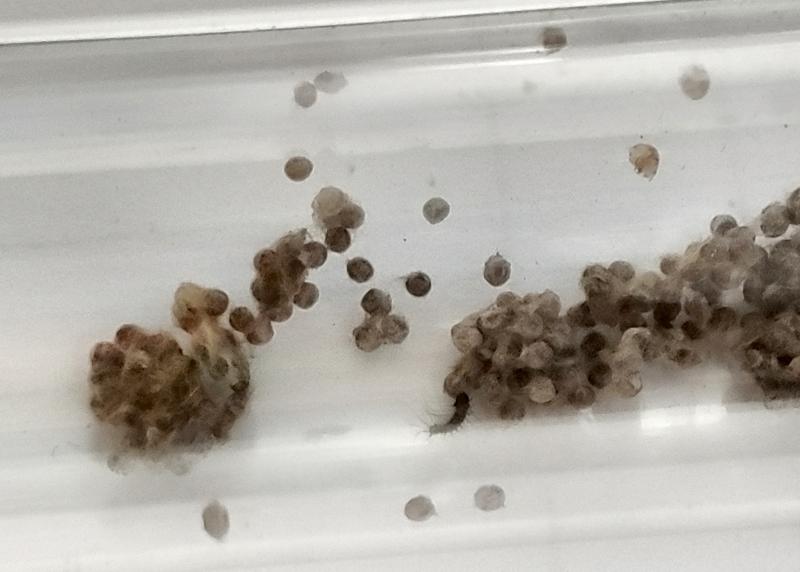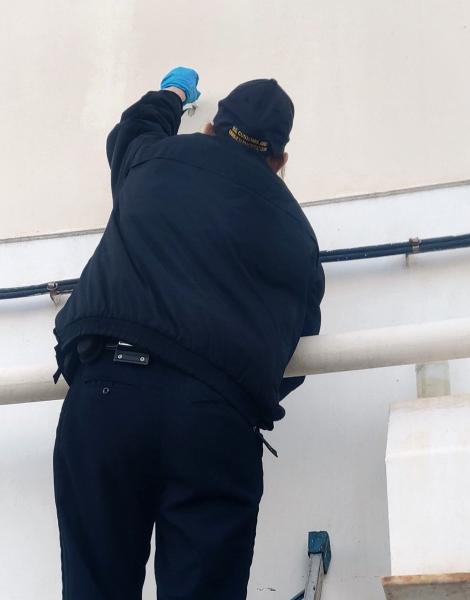BALTIMORE – While families celebrated Christmas together, U.S. Customs and Border Protection (CBP) agriculture specialists in Baltimore climbed aboard ocean freighters and searched for destructive insect invaders that threaten our nation’s agricultural interests.

hatched larva in a CBP preservation vial.
That search proved fruitful as CBP agriculture specialists discovered two egg masses on the bulk freighter Royal Hope that later proved to be from the highly destructive Asian Gypsy Moth (AGM) subspecies. CBP agriculture specialists and the ship’s crew removed the egg masses, and CBP treated the affected area with a pest spray oil.
One egg larvae hatched while CBP packaged the specimens for shipment to the U.S. Department of Agriculture (USDA) entomologist. A USDA DNA test confirmed on December 31 that the insects were Lymantria dispar asiatica/japonica, commonly known as the Japanese gypsy moth.
Asian Gypsy Moth (AGM) is one of the most destructive insect pests in the world. They are not known to occur in the United States.
According to the USDA, AGM poses a significant threat to our nation’s forests and urban landscapes as it is known to be extremely mobile – females can travel up to 25 miles per day – is attracted to lights, can lay egg masses that could yield hundreds of hungry caterpillars, and is itself a voracious eater that attacks more than 500 species of trees and plants. If they would become established here, they could cause serious, widespread damage to our country’s landscape and natural resources.
The Royal Hope had just arrived from Ghent, Belgium to pick up a load of coal for export. The ship made a previous port call in June 2019 to Niihama, Japan. While there, an authorized third party Japanese inspection company and the vessel’s crew removed 42 adult AGMs and 29 AGM egg masses. The authorized certification company provided a pre-departure AGM certificate and deemed the vessel cleared to depart.
“The fact that this vessel was completely scrubbed several months ago shows just how serious a threat the highly invasive and destructive Asian Gypsy Moth poses to our nation’s agricultural industries and consequently to our nation’s economy. It also illustrates why Customs and Border Protection agriculture specialists must remain extraordinarily vigilant to mitigate these potential threats through stringent inspections of merchant vessels and their cargo that arrives into Baltimore every day,” said Casey Durst, CBP’s Director of the Baltimore Field Office.

specialist scrapes an egg mass
off the ship’s bulkhead.
CBP agriculture specialists mitigated more than 150 AGM egg masses aboard seven cargo ships in August and September 2019.
CBP agriculture specialists and USDA Animal and Plant Health Inspection Service (APHIS) inspectors have conducted AGM inspection training with AGM high risk countries (Far East Russia, South Korea, Japan, and Northeast China) to help lower AGM risks.
Additionally, vessels making port calls in Asia generally implement stringent inspections to detect and remove egg masses, and foreign governments in the AGM high risk countries during the AGM high risk periods inspect and certify that vessels departing their ports are free of AGM or egg masses.
CBP agriculture specialists perform a critical border security role in safeguarding America’s agricultural and natural resources from harmful pests and plant diseases. They have extensive training and experience in the biological sciences and agricultural inspection, inspect tens of thousands of international air passengers, and air and sea cargoes nationally being imported to the United States.
During a typical day last year, CBP agriculture specialists across the nation seized 4,552 prohibited plant, meat, animal byproduct, and soil, and intercepted 319 insect pests at U.S. ports of entry.
See what else CBP achieved on a typical day during 2018, or by visiting www.CBP.gov.

